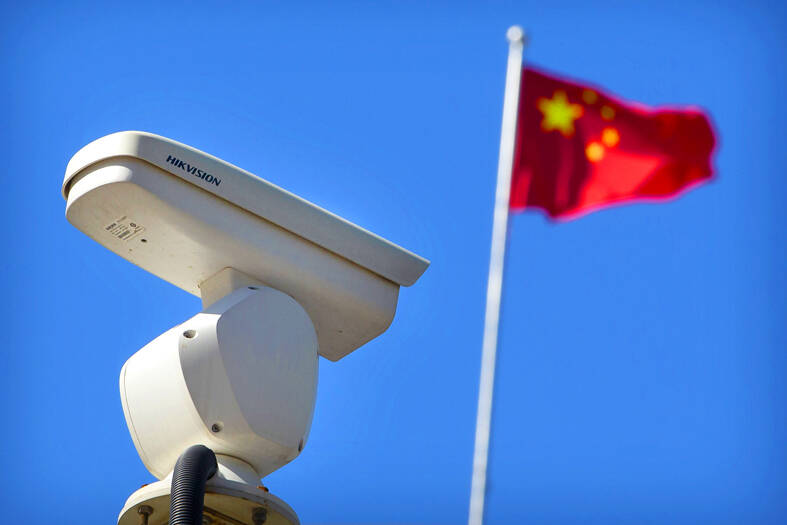The Ministry of Economic Affairs has been ordered to improve its internal oversight after Chinese-made surveillance equipment was discovered at an industrial park labeled as “made in Taiwan,” the Control Yuan said in a news release yesterday.
Control Yuan members Lai Ting-ming (賴鼎銘), Yeh Yi-chin (葉宜津) and Wang Li-chen (王麗珍) on Wednesday submitted a report urging the ministry to conduct a review after the situation was discovered last year and ensure that it would not recur.
An investigation by the Control Yuan’s Financial and Economic Affairs and Foreign and National Defense Affairs committees found the Hsinchu Industrial Park (新竹工業區) — which is administered by the ministry’s Industrial Development Bureau — had failed to adhere to the “information security is national security” policy when purchasing surveillance equipment as part of a maintenance project, it said.

Photo: AP
Last year, the Chinese-language CommonWealth Magazine reported that a mainframe at the Hsinchu Science Park used China-made parts and that the park had allegedly tried to hide the fact by labeling the equipment as made in Taiwan.
Bureau staff in charge of the project had not rigorously reviewed the project details, visited the site to inspect the equipment or verified the source of the machine, its type and whether its documentation was in order, the Control Yuan report said.
While the bureau has penalized the employee responsible, it should establish better internal control mechanisms to ensure that such incidents do not recur, it said.
The ministry should take the incident seriously and, with the assistance of authorities in charge of issuing certification stickers, ensure that products are indeed made in Taiwan, the Control Yuan said.
Domestic information technology equipment producers have systems in place that allow users to verify production processes, and the ministry should work with the Ministry of Digital Affairs and other authorities to ensure that government agencies and private companies prioritize purchases of domestic products, it said.
Separately, the Control Yuan said that the Ministry of National Defense should improve oversight of the Chungshan Institute of Science and Technology, as plans to create a “smart surveillance system” were behind schedule.
It should consider the inclusion of third-party verification and national security standards in bidding requirements, it said.

INVESTIGATION: The case is the latest instance of a DPP figure being implicated in an espionage network accused of allegedly leaking information to Chinese intelligence Democratic Progressive Party (DPP) member Ho Jen-chieh (何仁傑) was detained and held incommunicado yesterday on suspicion of spying for China during his tenure as assistant to then-minister of foreign affairs Joseph Wu (吳釗燮). The Taipei District Prosecutors’ Office said Ho was implicated during its investigation into alleged spying activities by former Presidential Office consultant Wu Shang-yu (吳尚雨). Prosecutors said there is reason to believe Ho breached the National Security Act (國家安全法) by leaking classified Ministry of Foreign Affairs information to Chinese intelligence. Following interrogation, prosecutors petitioned the Taipei District Court to detain Ho, citing concerns over potential collusion or tampering of evidence. The

‘FORM OF PROTEST’: The German Institute Taipei said it was ‘shocked’ to see Nazi symbolism used in connection with political aims as it condemned the incident Sung Chien-liang (宋建樑), who led efforts to recall Democratic Progressive Party (DPP) Legislator Lee Kun-cheng (李坤城), was released on bail of NT$80,000 yesterday amid an outcry over a Nazi armband he wore to questioning the night before. Sung arrived at the New Taipei City District Prosecutors’ Office for questioning in a recall petition forgery case on Tuesday night wearing a red armband bearing a swastika, carrying a copy of Adolf Hitler’s Mein Kampf and giving a Nazi salute. Sung left the building at 1:15am without the armband and apparently covering the book with a coat. This is a serious international scandal and Chinese

Seventy percent of middle and elementary schools now conduct English classes entirely in English, the Ministry of Education said, as it encourages schools nationwide to adopt this practice Minister of Education (MOE) Cheng Ying-yao (鄭英耀) is scheduled to present a report on the government’s bilingual education policy to the Legislative Yuan’s Education and Culture Committee today. The report would outline strategies aimed at expanding access to education, reducing regional disparities and improving talent cultivation. Implementation of bilingual education policies has varied across local governments, occasionally drawing public criticism. For example, some schools have required teachers of non-English subjects to pass English proficiency

TRADE: The premier pledged safeguards on ‘Made in Taiwan’ labeling, anti-dumping measures and stricter export controls to strengthen its position in trade talks Products labeled “made in Taiwan” must be genuinely made in Taiwan, Premier Cho Jung-tai (卓榮泰) said yesterday, vowing to enforce strict safeguards against “origin laundering” and initiate anti-dumping investigations to prevent China dumping its products in Taiwan. Cho made the remarks in a discussion session with representatives from industries in Kaohsiung. In response to the US government’s recent announcement of “reciprocal” tariffs on its trading partners, President William Lai (賴清德) and Cho last week began a series of consultations with industry leaders nationwide to gather feedback and address concerns. Taiwanese and US officials held a videoconference on Friday evening to discuss the